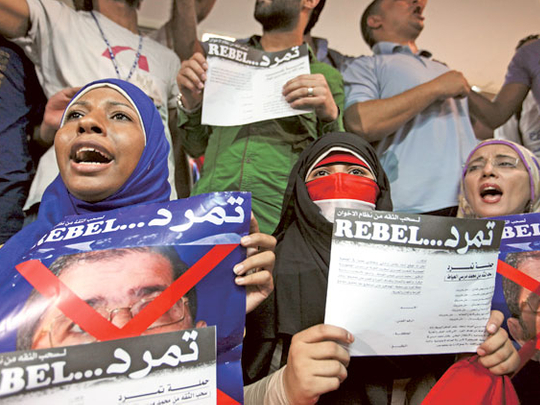
Cairo: “Down with Mursi the traitor,” reads a slogan spray-painted on a wall of Cairo on the eve of a protest campaign planned by the secular-leaning opposition against Islamist President Mohammad Mursi. A few metres away, another slogan, apparently painted by Mursi’s supporters, reads: “Mursi is the conqueror of secularists.”
Mursi, who hails from the powerful Muslim Brotherhood, has been locked for months in a sharp dispute with the opposition, who accuses him of betraying the revolution that brought him to power last year.
Mass nationwide protests are set for to demand Mursi to step down, a year after he was inaugurated as Egypt’s first democratically elected president. His backers have vowed to stop any bid to oust him, insisting he completes his term that ends in 2016.
“Several reasons have combined to bring Egypt to the present predicament,” said Mustafa Al Syed, a professor of political science at Cairo University.
“One major reason is the absence of a serious dialogue between the Brotherhood and the opposition as the Brotherhood showed early eagerness to dominate the state institutions, no matter what the obstacles could be,” he told Gulf News.
Another reason, according to Al Syed is the Brotherhood’s incompetence in running the affairs of Egypt, which is the Arab world’s most populous country. “The Brotherhood’s lack of efficiency has worsened the security and economic conditions in the country. In addition, the inexperienced Brotherhood has strained Egypt’s ties with several Arab and African countries.”
In recent months, anti-Mursi protesters have repeatedly taken to the streets and sometimes got engaged in deadly clashes with his supporters.
“Trust in Mursi has steadily been eroded because he failed to keep his promises of becoming president for all Egyptians and producing an all-inclusive constitution,” said Al Syed.
Mursi, who is Egypt’s first elected civilian president, is accused of discriminating against the country’s Christian minority, curbing freedom of the press, violating the judiciary’s independence and entrusting the drafting of a new constitution to an Islamist-dominated constituent assembly.
The contentious constitution was passed by a narrow margin of votes in a referendum last December.
“Mursi has shown failure in managing the country’s problems in his first year in power, a matter that has alienated many of his non-Islamist backers,” said Salah Al Hadi, a political expert.
Egypt has recently been hit by a severe fuel shortage, power cuts and price hikes of most basic commodities.
“The people who will participate in the Sunday protests are not necessarily interested in politics. They are frustrated people, who want to have a better life,” Al Hadi said.
“There is a common feeling in Egypt that the Brotherhood ruling lacks in efficiency and social justice, which was one of the main slogans of the revolution against Mubarak,” he added, referring to a 2011 uprising that forced president Hosni Mubarak to step down.
“The protesters, with their varying political awareness, will press for the Brotherhood’s departure from power or at least force the group to change its approach.”












